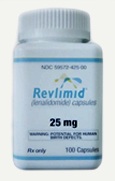 Thanks to a recent court ruling, a former Celgene sales rep's off-label marketing lawsuit will go forward. The rep, Beverly Brown, claims the company pushed its multiple myeloma drugs Thalomid and Revlimid for uses not approved by the FDA--and a judge says she's produced enough evidence to justify a trial.
Thanks to a recent court ruling, a former Celgene sales rep's off-label marketing lawsuit will go forward. The rep, Beverly Brown, claims the company pushed its multiple myeloma drugs Thalomid and Revlimid for uses not approved by the FDA--and a judge says she's produced enough evidence to justify a trial.
U.S. District Judge George King of California refused to dismiss the False Claims Act lawsuit, which Brown filed in Los Angeles in 2007. Unsealed in February after the Department of Justice chose not to join the suit, the 100-page-plus complaint alleges that Celgene ($CELG) marketed Thalomid and Revlimid for unapproved uses, leading to unnecessary Medicare and Medicaid claims. Under federal whistleblower laws, If Brown prevails, she'll get a share of any money recovered.
Celgene first won FDA approval for Thalomid in 1998 to treat a skin condition related to leprosy. Brown claims that, from the beginning, Celgene marketed the drug to oncologists for treating a wide variety of cancers. Thalomid won FDA approval to treat multiple myeloma in 2009.
When its second-generation drug Revlimid was approved in 2005 to treat a blood disorder called myelodysplastic syndrome, Celgene again focused its marketing efforts on promoting the drug for unapproved cancer uses, Brown claims. Both drugs are now FDA-approved to treat several forms of blood cancer.
In her whistleblower suit, Brown alleges that Celgene trained its salespeople to market Thalomid and Revlimid off-label at sales meetings and other events. The suit also claims that Celgene reps promoted unapproved uses by touting studies that she says failed to provide adequate scientific evidence to support those uses. Brown points out that the initial label on Thalomid didn't include warnings related to its use in cancer, which she alleges made the off-label prescriptions "tantamount to ongoing human experimentation."
The Justice Department often jumps into whistleblower suits like Brown's, when prosecutors see an opportunity to prosecute FCA claims. DOJ investigations have resulted in multibillion-dollar off-label settlements with some Big Pharma companies. In this case, the DOJ decided not to join up, after investigating the allegations for almost three years.
Still, Judge King saw Brown's claims as worthy of further court action. In a ruling obtained by Bloomberg BusinessWeek, Judge King chided Celgene for trying to get the case thrown out, contending that Brown's complaint provides adequate evidence of wrongdoing. As King put it, "as a direct participant in Celgene's off-label promotion, Brown sets out the particular workings of a scheme that was communicated directly to her by those perpetrating the fraud."
Revlimid has overtaken Thalomid in the oncology market and is now bringing in more than $4 billion a year in sales for Celgene. Despite some hurdles with reimbursement overseas, sales of the drug have been so strong--growing 14% in 2013--that CEO Bob Hugin has boldly predicted that Celgene's total annual revenues would double to $12 billion by 2017, partly on impressive Revlimid growth. Last month, Celgene made another bid to boost Revlimid sales by striking a $45 million deal with NanoString Technologies ($NSTG) to develop a companion diagnostic that will help find the subset of lymphoma patients who are most likely to respond to the drug.
- access Brown's suit here (PDF)
- here's the Bloomberg BusinessWeek story
Special Report: Pharma's Top 11 Marketing Settlements